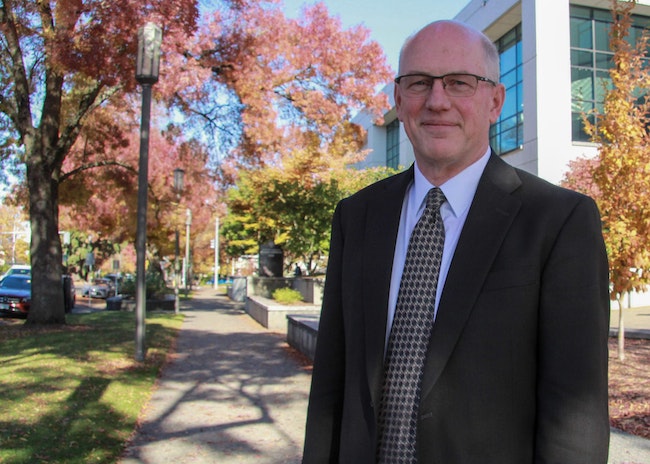
Steve Allen is director of the state agency charged with caring for Oregonians with mental health and substance abuse. (Sam Stites/Oregon Capital Bureau)
Finding a director to run a key new division of the Oregon Health Authority vexed Pat Allen for months.
The agency director worked with hundreds of internal and external stakeholders to search for someone who would bring experience and familiarity with Oregon’s forlorn behavioral health system. Allen needed someone to overhaul critical state services provided to the one in six Oregonians dealing with mental illness or substance abuse.
“Over those months I became convinced that every state’s behavioral health system is screwed up, but they’re each screwed up in their own way,” Allen said. “I really thought that local expertise was critical. We took several runs at trying to find the right candidate and never really got there.”
He found that those recruited to lead the agency’s behavioral health subdivision were well aware of the challenges facing Oregon’s emergency in mental health.
Mass homelessness, higher than average rates of addiction and suicide, a state psychiatric hospital nearly full and a system of community mental health programs that severely lack resources all needed attention.
Taking on the task of renovating the unit of state government responsible for looking after Oregon’s most troubled citizens was not attractive.
But where others saw a chaotic mess, Steve Allen saw opportunity.
[ Help build Salem Reporter and local news – SUBSCRIBE ]
At the time of the Oregon Health Authority’s search, Steve Allen, 63, was working with lawmakers, advocacy groups and behavioral health specialists to craft policy that would become Senate Bill 937, otherwise known as the Improving People’s Access to Community-based Treatment, Support and Services program (IMPACTS).
He was a consultant from the Washington D.C.-based Council of State Governments Justice Center tasked to help Oregon. He helped design the plan to infuse $10.6 million in grants to Oregon’s counties, tribes and regional consortiums to strengthen services for people who frequently cycle through jails, courts, and hospitals.
“I wanted to look at what the state could do differently to slow or stop that trajectory, and what additional services could be provided,” Allen said.
During his work on the 2019 legislation, Allen had the opportunity to see lot of the state and meet many passionate people in communities dealing with these problems. Oregon was the tenth state he’d worked in as a consultant and the only one that prompted him to share observations with his wife, back home in Wisconsin.
“I told her this was a place we could live for two reasons. One, Oregon is just gorgeous, but as importantly, I was really taken by the people here trying to work differently and improve systems,” he said.
Pat Allen co-chaired the SB 937 work group, and the pair — who are not related — became familiar with one another’s history, strengths and leadership styles.
“I was just so impressed with the quality of (Pat’s) leadership – clear, thoughtful, decisive self-reflective. He’s the kind of leader that I knew I could work for,” Allen said. “Having just worked in 10 states, the atmosphere here in Oregon was that so many people were coming together and saying, we need to create an environment in which we can do better for the people of Oregon.”
One day after a work group meeting, Allen casually asked Health Authority director how someone might apply for the job of behavioral health director.
Pat Allen pointed him in the right direction and went about his business, but hours later he picked up the phone and rang the consultant.
“I called him up and said, ‘Steve, I’m kind of dense, but are you the person that’s interested in the job?’” Pat Allen said.
The nationwide search came down to a conversation between the two, and it couldn’t have come at a better time. Mike Morris, who took over as interim behavioral health director following Royce Bowlin’s resignation after the Health Authority’s 2018 reorganization, had just retired.
“I came to realize a couple things. First, (Steve) is an honest-to-God national expert with experience in the trenches delivering care and running and operating statewide systems,” Pat Allen said. “Also, he just has an incredible way with stakeholders and clients, and he brings no ego.”
From his days as a graduate student at the University of Wisconsin, directing the mental health programs for the entire Minnesota prison system and consulting for the Council of State Governments, Steve Allen gained national acclaim in the realm of behavioral health.
His background includes working as a clinician in his home state of Wisconsin where he earned his master’s degree in social work with an emphasis on complex populations — patients with co-occurring illnesses.
He provided therapy to people on probation or parole in Minnesota before becoming director of psychology at the high-security Stillwater Correctional Facility.
“I learned a lot about people with very serious mental illness and addiction in helping them return back to the community,” Allen said.
He shifted out of prison work, overseeing 19 state clinics from psychiatric hospitals and residential programs to child and adolescent psychiatric facilities and transitional programs.
Pat Allen looks to his new director to improve accountability and transparency in state operations
Since taking over in April at a salary of $225,000, Allen has continued touring the state, hosting even more stakeholder listening sessions and devising a new approach to the state’s coordination of more than $2 billion in spending on behavioral health care treatment.
He’s heard that due to Oregon’s housing shortage, the stakes are really high. Those who experience an episodic break or mental health crisis can end up losing their jobs and becoming homeless. Getting care once on the streets isn’t easy in Oregon, Allen said.
“It’s very difficult in Oregon to work your way out of that,” he said. “It’s this vicious cycle that we have to attend to.”
He said Oregon doesn’t have enough well-trained mental health professionals to meet that vast demand for mental health services.
He’s conscious of the fact that stakeholders have lost hope after hearing for years that things would change, and they didn’t. To gain their trust, he said he’ll need to mend some of those relationships with mental health advocates and professional across Oregon.
“I think a change process involves building relationships because it’s inherently disruptive,” he said.
Allen distilled his vision for Oregon’s behavioral health system into three words: simple, responsive and meaningful.
To him, that means access to mental health treatment should be easy, that the treatment Oregonians receive should respond to their specific needs, and that there is meaningful change in their lives.
To quantify success, Allen said, he plans to keep an eye on the statistics to ensure the state’s overhaul of its behavioral health systems is working for those who need it most.
“I’d love to see our suicide rate reduced, and I think it’s critically important in improving from roughly 50% of people with serious mental illness getting care in a given year and moving that up to 60-70%,” Allen said.
Contact Reporter Sam Stites: [email protected] or 971-255-2480.









